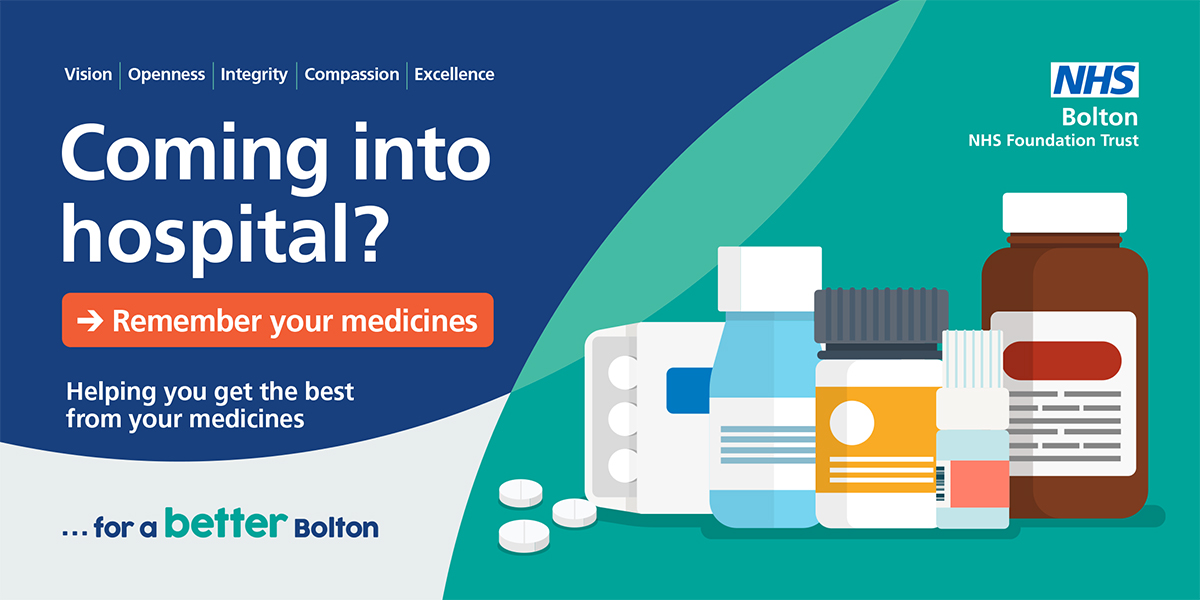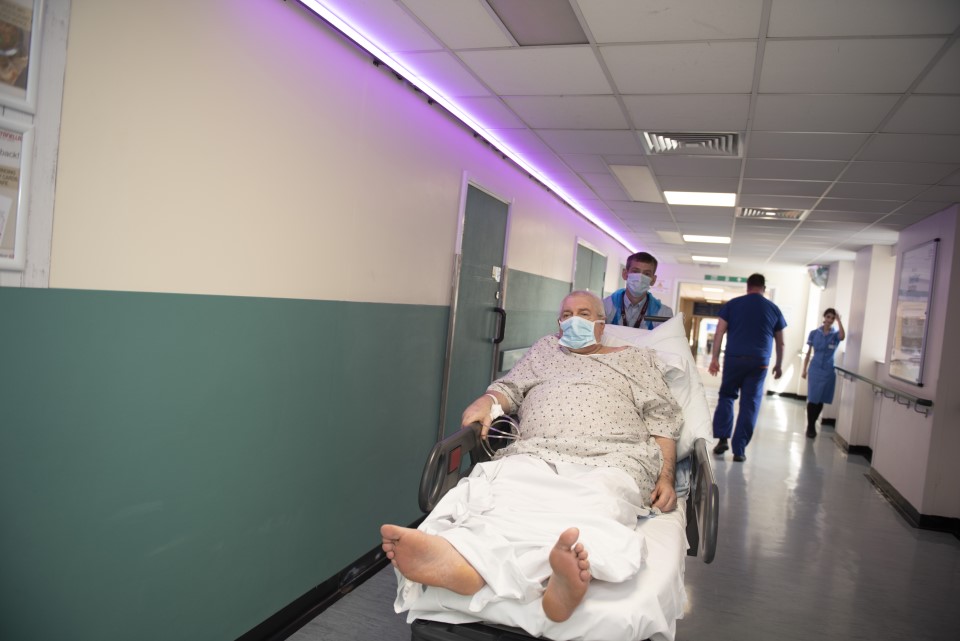Your stay with us
Your stay with us
If you’ve been referred for an operation, test or treatment and you need to stay overnight, it means you’re being treated as an inpatient. Inpatient care is provided at the Royal Bolton Hospital and by the intermediate care service at residential centres.
If you are coming into hospital for a planned operation or treatment your letter will tell you what you need to bring in with you, which is mostly the day to day things like nightwear, toiletries and the medicines you take at home. Please be sure to remember to bring in any walking aids, glasses and hearing aids if these are used. Staff will need contact numbers for relatives and details of your doctor. If you have any problems and think you may not be able to come in on the planned date, please let us know immediately by ringing the number on your letter to speak to someone.
Please do not bring any valuables such as jewellery or large amounts of money with you. If you do have any valuables with you, you are advised to hand them to staff for safekeeping and you will be given a receipt, or give them a friend or relative to take home.
The Trust does not accept responsibility for any loss or damage to personal property that is not handed in to staff for safekeeping.
The hospital site is large and may seem confusing but the main reception is well-signposted and staff there will be happy to direct you to your ward.
When you arrive at the ward a member of staff will welcome you and show you to your bed.
In order to make sure we give the right care to the right person all patients are given a wristband on their admission to wear all the time they’re in hospital. Please check that the information on the wristband is correct for you. If the wristband is removed for any reason please let a member of staff know immediately so it can be replaced.
You’ll be told which nurse is mainly responsible for your care but please tell staff which medicines you usually take and if you have any allergies. Staff are there to help you, so if you have any questions at all about any of your care and treatment please do not hesitate to speak to a member of staff.
We encourage you to bring your own medicines with you when you have a hospital stay, including when you attend the Emergency Department.
This ensures you have the correct medication right from the start.
If a patient needs new prescription when they’re discharged, or if their instructions for their pre-existing prescription has changed, our pharmacy team will provide a minimum of seven days’ worth of any medicines.

Some medicines are manufactured using material of animal origin. If this is a concern, please inform the health care professional looking after you. If you do not wish to take a certain medicine, then we will try and find an alternative. Sometimes the alternative may not be as effective or there may not be a suitable option that doesn’t contain animal products.
You will need to consider the risk of not taking a medicine and we can help explain these risks.
Our hospital site is completely smokefree, and you will be asked to stop smoking. Around many of our entrances are the wards caring for some of our most vulnerable patients; our children’s ward, our maternity unit, and patients recovering from surgery. Please help us to keep them safe by not smoking around them.
We know how challenging it can be to quit smoking, but with such significant risks to your health from smoking, we want to do everything we can to support you to quit.
We provide all patients in hospital with access to smoking cessation support so that it doesn’t add to the pressures of being unwell in hospital, through our specialist CURE team. Please ask the nurse in charge of your care to refer you.
If you’re visiting someone in hospital, please do not smoke on site. If you’re looking for support to quit smoking in Bolton, please visit Let’s Keep Bolton Moving for support in the community.
Wards are busy places but they are dedicated to you, the patient. You’ll have a locker for your things and each day you’ll be given a menu and asked to choose the meals you would like. Please speak to a member of staff if you need help with any special dietary requirements.
There is a sister or charge nurse who looks after each ward and your doctor will come to see you to discuss your care. Sometimes students are involved in your care because they need to learn, but if you don’t want this just tell your doctor or nurse – it’s not a problem.
The doctors, nurses and therapists will ask you to agree to any form of examination, treatment or care. It is important that you feel you have been given enough information before you agree to particular aspects of treatment. You are always free to say no or to ask for more information.
If you are having an operation, written consent is needed. This involves signing a consent form, which is a written record that you have agreed to the treatment. The risks and benefits associated with the treatment must be documented on the consent form for you to read before you sign it. You will be given a copy of this document.
If at any time you are feeling at all confused or worried about any of your treatment or care, please do not hesitate to talk to staff about it and they will do everything they can to help you.
Wards can be very busy and noisy at times. We are working hard to reduce unnecessary noise, such as from bins closing and noisy doors. Rest is very important, so if you are bothered by noise at night, please let a member of staff know, so that something can be done.
Every patient has the right to receive high quality care that is safe and effective and respects their privacy and dignity. This is one of the guiding principles of the NHS Constitution and is at the heart of our values in Bolton.
Our wards are divided into small areas called bays and are for women-only or men-only.
In summary:
- Patients who are admitted to our hospitals will only share the room where they sleep with members of the same sex, and same-sex toilets and bathrooms will be close to their bed area.
- Sharing with members of the opposite sex will only happen when clinically necessary, for example where patients need specialist equipment, such as critical care.
- Trans people will be accommodated according to their presentation: the way they dress, and the name and pronouns they currently use. This is regardless of the physical sex appearance of the chest or genitalia, or whether they have a gender recognition certificate (GRC).
- Non-binary people, who do not identify as being male or female, will be asked discreetly about their preferences, and allocated to the male or female ward according to their choice.
- Some patients may live temporarily in a gender role that does not conform to their natal sex and in these cases we will always be respectful and flexible.
If you have any concerns regarding same-sex accommodation please raise them with the ward manager in the first instance.
Most beds have Hospedia services which include a phone, TV and radio. You register for this service and buy cards to operate it, available from vending machines close to wards or at the WRVS shops. Children receive free TV from Hospedia. The service gives you terrestrial TV channels with headphones, free radio (including hospital radio run by the Bolton Lions who also take music requests via cards on the ward) and a telephone line.
All inpatients have free access to newspapers and magazines online using the NHS WiFi. Ask on the ward for more information.
It is important that the privacy, dignity and confidentiality of all our patients and staff is respected and we therefore ask that patients and visitors do not take photos or comment on social media about other patients, visitors or staff.
It can sometimes be daunting going home when you are recovering from an illness or operation, so arrangements can be made for help at home if you need it. Ask a relative or friend to bring clothes suitable for leaving hospital for you the evening before you leave and arrange for someone to collect you, unless there is a special reason for you to have an ambulance. When you leave we will make sure you’ve got all the medicines you need and any appointments you are to attend in the future. If you have any questions at all, speak to a member of staff.
It may be that, although you are medically ready to leave hospital, you have not got enough confidence to return home again immediately or you need to be helped towards more independence. Before you leave, our teams will assess if you have any needs that you may need further support with after you have been discharged.
We can accept no responsibility for any such property, including money, which is lost or damaged unless it has been handed over for safekeeping and an official receipt has been obtained from the Patient Property Receipt Book.
